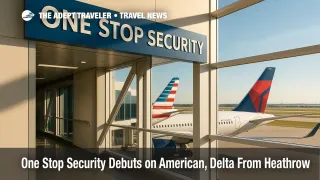One Stop Security Debuts on American, Delta Flights From Heathrow

The United States is streamlining international connections. American Airlines has started flying London Heathrow (LHR) to Dallas Fort Worth International Airport (DFW) under the new One Stop Security (OSS) procedure, and Delta Air Lines will add a London-to-Atlanta (ATL) option by late July. Travelers on qualifying itineraries clear full screening in London, then walk straight from their U.S. arrival gate to their next flight-no baggage reclaim, Customs detour, or repeat TSA checkpoint. Aviation officials say the move could cut minimum connection times in half and reduce lost-bag incidents, while industry groups call for more bilateral deals to scale the program.
Key Points
- Why it matters: Eliminates duplicate screening, shaving up to one hour off tight U.S. connections.
- OSS applies to select American Airlines and Delta Air Lines inbound flights from LHR.
- Bags move automatically; travelers head directly to their onward gate at DFW or ATL.
- The trial is a joint project of TSA and the U.K. Department for Transport, launched after February tests.
- U.S. Travel Association urges at least five additional OSS agreements within five years.
- Success could influence airport planning ahead of America 250, the 2026 World Cup, and the 2028 Olympics.
Snapshot
American's LHR-DFW service is now the first regular OSS route into the United States. Upon arrival, passengers remain in a sterile corridor, clearing U.S. Customs at the jet bridge while airline systems track and forward checked luggage. Delta's inaugural OSS flight, slated for the last week of July, will mirror that process at Atlanta's Hartsfield-Jackson hub. Both carriers anticipate faster gate-to-gate transfers, improved on-time performance, and a stronger case for adding late-morning European departures that previously faced missed-connection risk.
Background
"Equivalent security" agreements have been on ICAO's agenda for more than a decade, yet adoption has lagged. Under traditional rules, every arriving traveler-even one screened to U.S. standards abroad-must reclaim bags, pass Customs, re-check luggage, and re-enter TSA lines. OSS treats London screening as interchangeable with U.S. procedures, provided data links confirm each bag's chain of custody. February's closed-door trial at Heathrow proved the model's technical feasibility, using RFID baggage tags and live biometrics at boarding gates. Lessons learned informed today's operational rollout.
Latest Developments
Delta Joins the Pilot at ATL
Delta's first OSS rotation will touch down in Atlanta before the end of July, giving the airline a test bed at its largest hub. Delta managers say the carrier already moves more than 2,000 Heathrow-originating passengers through ATL daily; OSS could free scarce gate space and shorten minimum connection windows from 90 to 45 minutes. If targets are met, Delta intends to expand the model to New York-JFK and Detroit by 2026.
Industry Push for Broader Adoption
The U.S. Travel Association's Commission on Seamless and Secure Travel argues that OSS is essential for restoring America's share of long-haul visitors. The group wants TSA to negotiate at least five new country-level pacts within five years, focusing on markets with equivalent technology and incident-response standards. Business travel advocates add that shorter connections boost airline scheduling flexibility, potentially unlocking additional transatlantic frequencies at slot-constrained Heathrow and Gatwick.
Analysis
Early passenger feedback from the Heathrow-DFW corridor has been positive: transiting travelers report a "domestic-level" experience despite clearing Customs landside. Operational data back that perception. American's first week showed average connection times of 42 minutes and a 30 percent reduction in misrouted bags compared with traditional arrivals. For airports, OSS could relieve pressure on Customs halls and TSA checkpoints, delaying expensive expansions. Challenges remain, chiefly the cost of integrated baggage tracking and the need for mutual recognition of security protocols. Some U.S. unions warn that removing a screening layer might weaken defenses, though TSA insists that layered intelligence offsets the risk. Much hinges on data sharing: if Heathrow's model proves reliable, Brussels and Dublin-both long-time advocates of one-stop screening-may be next in line.
Final Thoughts
One Stop Security signals a shift from duplicate checks to outcome-based security cooperation. If the Heathrow-to-U.S. trials meet performance goals, travelers could soon see faster, simpler transits on a growing list of routes. For now, American Airlines and Delta Air Lines customers on the qualifying flights will enjoy a preview of what a modern, world-class travel system can deliver-seamless, secure, and decidedly more predictable. One Stop Security may finally turn the long connection slog into a quick walk to the next gate.
